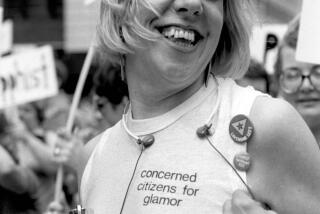Welfare Rights Pioneer Tillmon-Blackston Dies : Activism: In the 1960s, a single mother in a Watts housing project helped form a group that sought better treatment and services for the poor.
- Share via
Johnnie Tillmon-Blackston, a single mother in Watts turned leader of the 1960s welfare rights movement, has died. She was 69.
Mrs. Tillmon-Blackston, a diabetic who used a wheelchair after the amputation of a foot and was on dialysis for the last four years, died Wednesday at Huntington Memorial Hospital.
She went on welfare 30 years ago as a resident of the Nickerson Gardens housing project raising six children by herself.
But Mrs. Tillmon-Blackston never got used to the midnight raids, when welfare officials would storm through the projects looking for evidence of a hidden windfall--proof of a man in residence, or evidence of secret profits.
So she helped organize and became the first chairwoman of the National Welfare Rights Organization, a group of thousands of mostly women welfare recipients that eventually included members from across the country. The government, they argued, had the obligation to help those in need and treat them with dignity.
The group would later be seen as an influential force for the institutionalization of welfare and the imposition of federal standards that forced states to take care of their poor.
Mrs. Tillmon-Blackston, a migrant sharecropper’s daughter from Scott, Ark., who never graduated from high school, learned to be an activist after her divorce, when she was a union shop steward in a Compton laundry. Worried about leaving her children home without her, she left that job in 1963 and sought public aid.
She found public harassment instead.
Mrs. Tillmon-Blackston began to organize, sending letters to all the Nickerson Gardens residents calling for a meeting of welfare recipients.
The group later joined a statewide coalition and Mrs. Tillmon-Blackston went to the first national convention of welfare recipients in 1966.
Mostly poor and African American, Mrs. Tillmon-Blackston’s group aligned their goals with those of the civil rights movement, while at the same time actively appealing for the involvement of the country’s biggest welfare constituency: whites.
Her group’s members were among the civil rights movement’s few women leaders and some of the first to articulate a view that poverty was increasingly feminized--a result of poor child care, lower wages and Great Society programs that shifted billions of dollars to senior citizens.
In 1972, facing a country and Administration increasingly hostile to her beliefs, Mrs. Tillmon-Blackston moved to Washington to become the organization’s executive director. It was a paying job and a ticket off the welfare rolls.
When the group closed down in 1974 for lack of funds, Mrs. Tillmon-Blackston returned to Los Angeles and worked in local and state welfare rights issues.
She lived in a small house in Watts with her husband and nine grandchildren she was helping to rear.
In recent years, Mrs. Tillmon-Blackston was forced to watch her dream of welfare as entitlement begin to die and the pendulum of public sympathy for the needy swing far to the right.
“When I think of my life, I think of someone who really cared, who wanted to change things in America for the poor,” Mrs. Tillmon-Blackston told The Times in a July interview. “An outspoken person who could raise hell if needed and a person who could be meek and humble if needed to be.”
Mrs. Tillmon-Blackston is survived by her husband, Harvey Blackston, six children, 20 grandchildren and six great-grandchildren.
More to Read
Sign up for Essential California
The most important California stories and recommendations in your inbox every morning.
You may occasionally receive promotional content from the Los Angeles Times.













